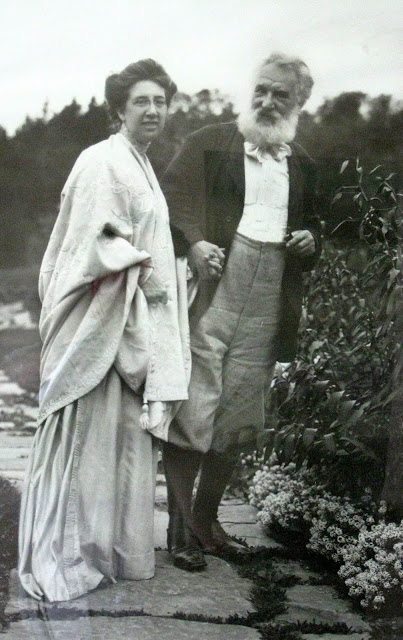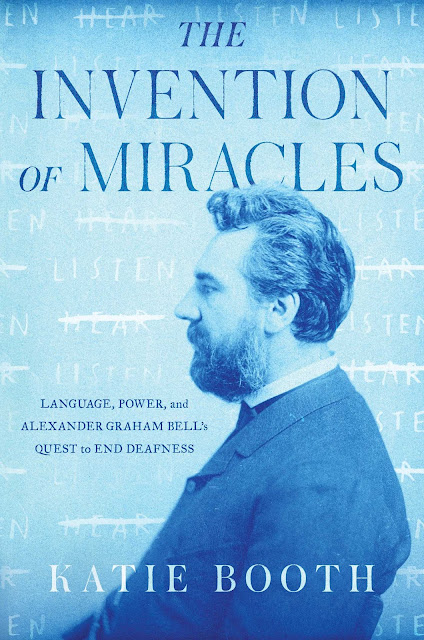Alexander Graham Bell and "avoidable savagery"
Here are a couple memorable quotes and a quick review of The Invention of Miracles: Language, Power, and Alexander Graham Bell's Quest to End Deafness by Katie Booth
A couple years ago I read The Invention of Miracles: Language, Power, and Alexander Graham Bell's Quest to End Deafness by Katie Booth. It was a very interesting (if a little clumsy with focus at times) revisionist biography of Alexander Graham Bell, who is best known for inventing the telephone.
"Meticulously researched, crackling with insights, and rich in novelistic detail. By shining a bright light on society's assumptions about disability, Booth's book is a profound and lyrical meditation on what it means to be human."
- Steve Silberman, New York Times bestselling author of NeuroTribes
I read it because I was surprised to learn of Bell's curious, devastating work in the deaf communities of his time--his own wife, Mabel Gardiner Hubbard, was deaf. Indeed, I'm ashamed to say I have read very little about dis/ability history of any kind, and so I learned a lot from Booth's well-researched book.
One of the many things that got me thinking in reading Invention of Miracles was this idea of dedicating your life's work to something that is ultimately a failure and rooted in prejudice--you can be very passionate about something and leave a devastating legacy. You can have a brilliant mind, work endlessly for a cause, and without intersectionality and empathy, it all kind of falls apart.
In Bell's case, he wanted to end deafness. He took up this mantle as a noble cause, but as Booth points out in her book, having the best of intentions doesn't cut it, and his work and philosophy regarding deafness still has negative impacts today.
 |
| Above: Alexander Graham Bell and Mabel Gardiner Hubbard |
The same year I read Booth's book, I read Washington Black by Esi Edugyan. I came across this quote in Edugyan's book, which reminded me so much about what Booth was talking about with Bell in her own book:
He had spent years trying to cultivate an ethos, and despite possessing a clear intelligence, he had lived his whole life in avoidable savagery.
from Washington Black by Esi Edugyan
You know, just some thoughts on the work we do, the legacy we leave, and how to live and work conscientiously, and with empathy.
Here are a couple more noteworthy quotes from Katie Booth's The Invention of Miracles: Language, Power, and Alexander Graham Bell's Quest to End Deafness:
“Saving can become more important than recognizing; fixing more important than loving. This was Bell’s greatest mistake. He got so caught up in the feeling of sympathy that he never veered into empathy; his imagination didn’t stretch enough to understand, or even ask, what the deaf themselves wanted”
“Bell was able to get away with what he did because he was protected by a power structure that did not value deaf experience or deaf voices. Bell thought he was bringing the deaf and hearing closer together, but in refusing to allow for deaf agency, he drove us further apart. His ideas continue to drive us further apart.“
Update February 2025
I submit another quote from The Age of Insecurity, where Astra Taylor more adroitly identifies the "moral and political" opportunity of caring for others with an intersectional perspective. Taylor is referring to economics, community care, and material security, though her words still resonate in connection to the two works mentioned above:
Where some insist that the real risk lies in taking care of others, I see a moral and political opportunity. As the Dauphin experiment illustrates, having a baseline of material security is about more than money-it increases people's dignity and autonomy. The fact is, most of us do not want to be spurred to work and scramble to earn until we die. Even Americans, steeped in a culture of competition and striving, wish they could stop the chase. When the Pew Charitable Trusts conducted a poll asking if people would prefer financial stability to upward mobility, more than nine out of ten respondents said they would eagerly abandon the pursuit of wealth for security.
- from The Age of Insecurity: Coming Together As Things Fall Apart by Astra Taylor


